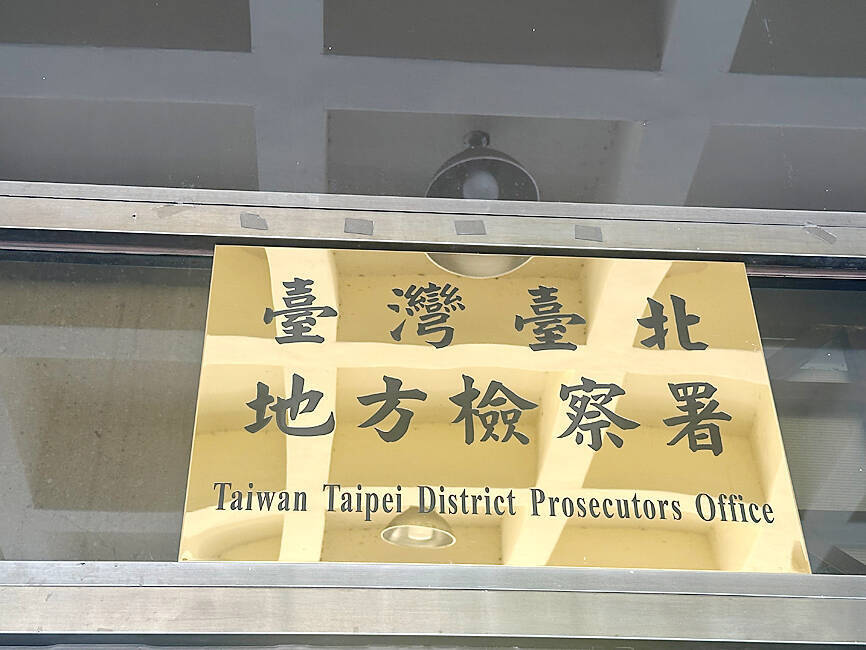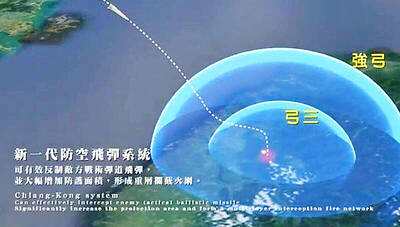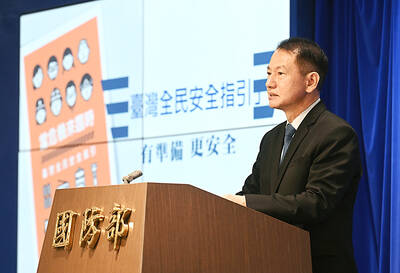The Taipei District Prosecutors’ Office yesterday indicted two employees and an outside contractor of Radio Taiwan International (RTI) for allegedly launching a cyberattack against the radio station’s Web site in September.
Prosecutors denounced that Wu and Yue’s actions, such as replacing the website banner with the People’s Republic of China flag, would provoke cross-strait tensions, and therefore sought a penalty of up to three years imprisonment.
The suspects include engineer Wu Cheng-hsun (吳政勳), his manager, Yueh Chao-chu (岳昭莒), and Huang Fu-lin (黃富琳), who worked as a systems maintenance contractor for RTI, the indictment document said.

Photo: Wu Sheng-ju, Taipei Times
Prosecutors said the men planned cyberattacks against RTI in June, with Wu giving Huang an account with the highest level of access so Huang could provide technical support and delete records of Wu’s activities on the Web site.
Yueh, who was informed by Wu about his actions, did not intervene nor report them to his superiors.
Wu on Aug. 20 interfered with the parameters of the RTI Web site, changed its Japanese main page so that it showed simplified Chinese or garbled characters, and interrupted the Web site’s signal, prosecutors said.
On Sept. 11, 18, 19 and 20 he allegedly changed RTI’s main site and replaced the Web site with the cover of the book Retaking the Mainland by the Taiwanese Government: The Concept of Chinese Unification by the ROC, and changed the banner to the flags of the People’s Republic of China and the US.
After being questioned on Sept. 26, he logged onto the RTI Web site and disrupted its functions, showing no signs of remorse, prosecutors said.
Wu and Yueh claimed they acted because they suspected Chinese capital was interfering with the RTI Web site, prosecutors said.
Wu’s actions damaged RTI’s credibility and disrupted its operations, prosecutors said, while local media reported that Wu claimed that he did so to identify loopholes in the broadcaster’s system.
The images that Wu put on the Web site raised tensions across the Taiwan Strait, posing a danger far greater than a general criminal offense, prosecutors said.
Wu’s plan to attack the site on Oct. 10, Double Ten National Day, carried great symbolic meaning, they said.
As the only government-run radio station broadcasting to the international community, RTI is classified as level A key infrastructure according to the Regulations on Classification of Cyber Security Responsibility Levels (資通安全責任等級分級辦法), prosecutors said.
RTI said that its personnel review committee last month decided to fire Wu and issue a major demerit to Yueh for his supervisory misjudgement.

LIMITS: While China increases military pressure on Taiwan and expands its use of cognitive warfare, it is unwilling to target tech supply chains, the report said US and Taiwan military officials have warned that the Chinese People’s Liberation Army (PLA) could implement a blockade within “a matter of hours” and need only “minimal conversion time” prior to an attack on Taiwan, a report released on Tuesday by the US Senate’s China Economic and Security Review Commission said. “While there is no indication that China is planning an imminent attack, the United States and its allies and partners can no longer assume that a Taiwan contingency is a distant possibility for which they would have ample time to prepare,” it said. The commission made the comments in its annual

DETERMINATION: Beijing’s actions toward Tokyo have drawn international attention, but would likely bolster regional coordination and defense networks, the report said Japanese Prime Minister Sanae Takaichi’s administration is likely to prioritize security reforms and deterrence in the face of recent “hybrid” threats from China, the National Security Bureau (NSB) said. The bureau made the assessment in a written report to the Legislative Yuan ahead of an oral report and questions-and-answers session at the legislature’s Foreign Affairs and National Defense Committee tomorrow. The key points of Japan’s security reforms would be to reinforce security cooperation with the US, including enhancing defense deployment in the first island chain, pushing forward the integrated command and operations of the Japan Self-Defense Forces and US Forces Japan, as

INTERCEPTION: The 30km test ceiling shows that the CSIST is capable of producing missiles that could stop inbound missiles as they re-enter the atmosphere Recent missile tests by the Chungshan Institute of Science and Technology (CSIST) show that Taiwan’s missiles are capable of intercepting ballistic missiles as they re-enter the atmosphere and pose a significant deterrent to Chinese missile threats, former Hsiung Feng III missile development project chief engineer Chang Cheng (張誠) said yesterday. The military-affiliated institute has been conducting missile tests, believed to be related to Project Chiang Kung (強弓) at Pingtung County’s Jiupeng Military Base, with many tests deviating from past practices of setting restriction zones at “unlimited” and instead clearly stating a 30.48km range, Chang said. “Unlimited” restrictions zones for missile tests is

PUBLIC SAFETY: The nationwide distribution campaign aims to enhance society’s overall understanding of threats and bolster defense awareness, an official said The latest edition of the National Public Safety Guide is being mailed to all citizens starting today to foster public awareness of self-defense in the event of war or natural disasters, the Ministry of National Defense said yesterday. “The guides will be disseminated to the public to enhance society’s overall understanding of threats and bolster defense awareness, demonstrating the government’s emphasis on people’s safety and its determination to pursue self-defense,” All-out Defense Mobilization Agency Director Shen Wei-chih (沈威志) said at the ministry’s news conference. The nationwide distribution campaign was planned according to President Lai William’s (賴清德) Sept. 20 directive, he said, adding